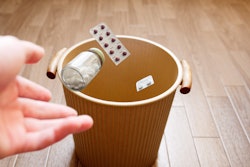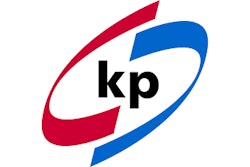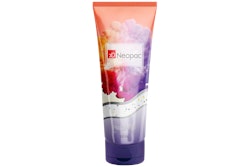Want to view the rest of this pertinent conversation? Find the full free video here: Sustainable Packaging TODAY — Full Webinar
Listen to the story here:
 | Read the transcript below: |
Matt Reynolds: Hello and welcome to today's webinar. I'm Matt Reynolds editor of Packaging World Magazine and I'm here with Paul Jenkins, Managing Director of the PackHub.
Paul Jenkins: Okay, so the first innovation I'd like to talk about today is one which is part of a growing packaging trend area which is around reusable and refillable packaging. And what we've got here is multinational packaging and paper group Mondi, who have collaborated with a German chemical and consumer goods company Henkel to launch 100% recyclable and refillable pouches for Henkel's dishwashing brand Pril. For the German market, it is reported that the pack's plastic content has been reduced by 70% from previous iterations, and it is to be used as to refill and recycle PET pump dispenser bottle. Simple and light-to-carry, consumers can easily empty the packaging without leaving any waste product within—due to its ergonomic design. The collaboration benefits both company's goals of packaging all of their products in 100% recyclable or reusable materials by 2025. And indeed, many brands, retailers, and packaging suppliers are working to that goal for the year 2025. This is a typical example of a refill execution and clear branding on the front to sort of direct the consumer to what they need to be doing. And a clear message that it's saving plastic usage across the top as well. So just quite a good example to get us on the go.
Matt Reynolds: Yeah, and that's I mean, that's a key element that you bring up there is is consumer education, there's this is another example from Kao Corp. And they use what's called the "bottle for life." It's not necessarily for life, but they aim for at least 100 cycles of use and refills, so the bottle for life is meant to be beautiful. In this case, MyKirei is the brand within Kao Corp. You can see that the dispensers actually dispenses hand soap in shapes for children, like a flower or a paw print. So something interesting to keep kids interested. These are beautiful bottles that can withstand many, many cycles and remain in your bathroom for you know, months and months. You'll be continually refilling them with the package on the left. And the package on the left is actually plastic. It's a flexible stand up pouch for the hand wash. The system reports to reduce packaging by more than 85% compared to rigid packaging. And what's interesting is the bottle for life is HDPE. The replacement film pouches are actually in line with TerraCycle. So somebody can refill their botte and then they can send them back by mail—free of postage—to TerraCycle. And TerraCycle is able to then reuse that stand-up film pouch. So again, another interesting example where consumer education is key.
Paul Jenkins: So what I particularly like about this is not just the consumer education piece, but also the fact that they're supporting the changes through talking about the percentage reduction in plastic and things like that. So they're not just making the changes, they're actually supporting that with some evidence of why it's a good thing from a sustainability point of view.
So next up is a French beauty and skincare brand, L'Occitane, and they've announced the launch of a range of plastic free alternatives to traditional liquid based products that are usually packed into single use plastic containers. Now, the word or phrase "single use plastic" has been a hot topic over the last two to three years and that certainly continues. The new range includes solid soap and shampoo bars and is expected to appeal to environmentally aware consumers as well as people on the go. The new range is also vegan and all the soap and shampoo variants are manufactured using 95% natural, environmentally safe ingredients. As well as being 95% biodegradable, the soap is available in three different scents. The soap bars are priced at nine pounds, which I guess is about $13 US dollars. Whilst this shampoo bars retail at about ten pounds, which is about $14 US dollars, a metal storage tin is also available for purchase and the outer packaging is 100% paper based and recyclable in the normal waste paper strip. What's interesting about this is that many of the innovations that we're now tracking are nods to the past—for example, resuable milk bottles—and here we have something like a solid soap bar which our older parents or grandparents would have been using in yesteryear. And the other thing interesting about this is that taking water out of the supply chain also reduces the complexity of packaging and also reduces costs as well. So that's quite an interesting, premium looking product example but very much a nod to the past as well.
Next up, Unilever in the U.S. has launched its Dove body wash in a reusable and refillable format. Consumers have the choice of two different options. The more expensive option is the Dove reusable aluminum bottle and body wash concentrate which is priced at just under $15 US dollars. It's comprised of an aluminum bottle and a squeezable concentrated body wash, which is a four ounce bottle that is four times concentrated, and when diluted with water makes up to 16 ounces of body wash. Yet again, another example of effectively taking water out of the supply chain and adding it the last moment of consumption. The body wash concentrate bottle uses 50% less plastic than a standard bottle—again communicating that plastic reduction message—and is made from recycled plastic. The other option is Dove's reusable bottle and body wash concentrate, which has a recycled reusable plastic bottle along with a concentrated body wash and retails for $9.99. The refill concentrates—both formats—are available in three scents. And what I particularly like about this, it's bang on trend in terms of encouraging usage of refillable and reusable packaging. I like the fact that they've done it as a set, because consumers need to know how to navigate this sector. This is new to them. This is different to what they've done before. So Dove and Unilever have tried their very best to do like a duo pack like this, to really get consumers and set them on their path to hopefully be a long term consumer of this packaging format.
Matt Reynolds: Yeah, that's that's a good point and setting consumers up to succeed. And we won't belabor this any further because clearly, you know, Dove and Unilever are way out in front in this case.
This is a deodorant pack that's a stainless steel pack reusable. And then the refill in this case is in an FSC certified carton board. Unilever and Dove seem to get it. This is again, that circular model. Consumer education is key to make sure that people succeed early on, because if they don't know what they're doing, and they can't figure it out, then that results in waste and waste works against the sustainability goals that we're trying to accomplish.
Paul Jenkins: Next up is the U.S. arm of Colgate Palmolive and that they aim to move their Colgate toothpaste tubes into recycled materials. So this is another packed format that has come under pressure in recent times for its seemingly lack of recyclability. So the new material will be a multi-layer, but mono material manufactered from HDPE (high density polyethylene) commonly used for things like detergent bottles, milk jugs, vitamin bottles, things like that. Initially, they found that the HDPE was a little too stiff to be able to squeeze the toothpaste out, which is quite an important factor. But after five years of development, they found a solution. So these things don't come overnight. And often it takes a long time to get to a point where the product packaging is suitable for their use. They arrived at a blend of different types of HDPE, including one which allows them to remove the aluminum layer to make it to pack recyclable. The caps were made of polypropylene. So in some cases, depending on the system in place, it will need to be removed from the tube. Leftover toothpaste in the tubes is said not to be an issue, as it is water soluble and will be washed out during the recycling process. So Colgate expects every single tube in their portfolio to be recyclable in the United States by next year and globally by 2025. That is fighting talk. That is not moving slowly. That is really going for it and solving a long standing challenge of the lack of recyclability.
Matt Reynolds: And what's really interesting about it is that Colgate aims to share that technology. The tube and the closure is polypropylene. The tube is different varieties, high density and low density of polyethylene, including EVOH. So that's instead of aluminum, EVOH would be your barrier layer for gas and gas ingress that sort of thing. So they're able to do it, but they realized early on that they weren't going to be able to get to the sustainability goals by themselves because—even though they are the toothpaste giant—they by themselves wouldn't be a drop in the bucket. So they said, and this is a quote, "From day one, it was never about Colgate having a recyclable tube. Tt was about the industry having a recyclable tube. If Colgate did it alone, it wasn't going to move the needle with regards to tubes getting recycled." So we're not sure yet whether that looks like a licensing model. I don't believe that's the case, it's more working with the supplier. So not necessarily their competitor brands, but with the suppliers in general. This is to push folks towards that model of different types of polyethylene high density and low density with a barrier being EVOH and trying to get the market and the tube manufacturers that are making the tubes and selling it to the brands to get on board with this variety, possibly using some of the technology or some of the know how that Colgate has developed. Because once they see that Colgate has gone the polyethylene with EVOH route then they can see that there's their company secrets being worn on their sleeve in a sense, but they're really definitely trying to push the industry that way.
Another Colgate example, as long as we're talking about toothpaste, is Elixir. Elixir is actually a PET bottle. Now PET with toothpaste sounded like an impossibility because PET is at least semi rigid, even thin PET is going to be a rigid bottle and this Elixir is no exception. But in this case, there's a unique coating called Liquid Glide that is a slippery coating that is applied on the inside of the transparent PET bottle. So the toothpaste is in there, the consumer is able to extract every last bit of toothpaste because of that slippery liquid glide layer on the inside. And we all have had the experience of trying to get every last little ounce of toothpaste out of the tube. So by virtually eliminating waste and also staying within the easily recyclable realm of PET, Colgate is going another route here with an interesting stand up semi rigid type of pack for toothpaste.
And that brings us to the conclusion of the webinar. Naturally. If you'd like to learn anything more about what we've discussed or would like to discuss more with us, visit our websites and use the email addresses to contact Paul or I. That's all the time that we have for Sustainability Today.





















